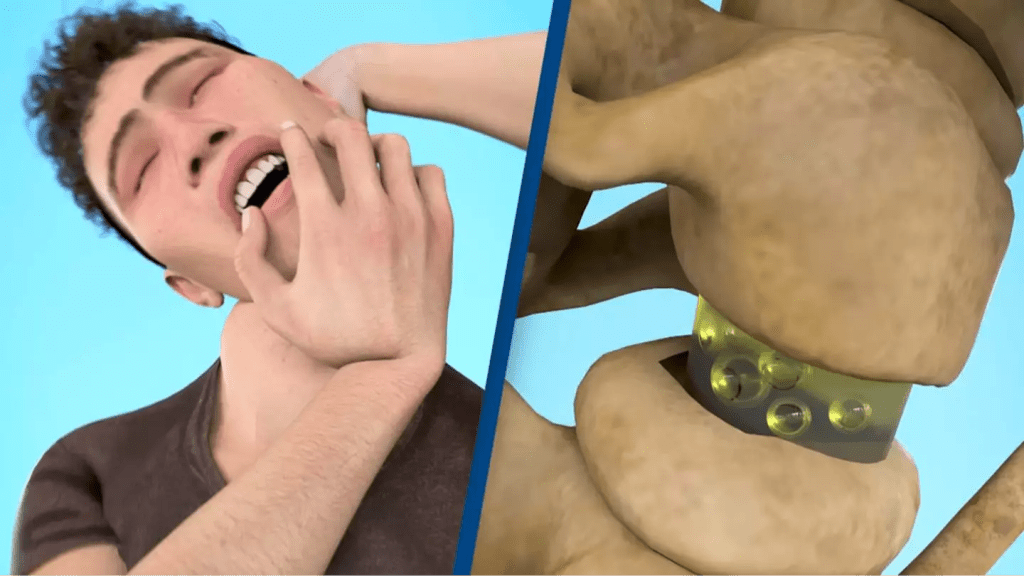For many people, cracking joints is a satisfying habit that provides a sense of relief and comfort. But when it comes to cracking your neck, recent evidence suggests that this everyday action could be more dangerous than you think. A chilling simulation video created by Zack D. Films on YouTube vividly demonstrates how forcefully cracking your neck could lead to serious, even life-threatening consequences.
Let’s explore how neck cracking works, why it can be risky, and what you need to know to protect your health.
What Happens When You Crack Your Neck?

When you crack your neck, the popping sound you hear is the result of gas bubbles bursting in the joint fluid. According to Harvard Health, this is similar to stretching a balloon until it pops. The pressure change in your joint releases these gas bubbles, creating that familiar popping sound.
For most joints, like your knuckles, this popping is relatively harmless. But neck cracking is different because of the sensitive structures that surround your cervical spine. While cracking your neck may offer temporary relief from stiffness, it can also strain delicate ligaments and even put pressure on critical blood vessels.
The Potential Dangers of Aggressive Neck Cracking
The simulation by Zack D. Films highlights a worst-case scenario: forceful neck cracking that leads to a tear in a blood vessel lining. When this happens, a blood clot can form, and if that clot travels to the brain, it can block blood flow, potentially resulting in a stroke.
Although such an outcome is rare, the link between neck cracking and stroke is not entirely new. According to the CDC, strokes were responsible for 39.5 per 100,000 deaths in the U.S. in 2002, with someone experiencing a stroke every 40 seconds in the country. While the majority of strokes aren’t caused by neck cracking, there have been cases that highlight this connection.
The Real-Life Case of Josh Hader
In 2019, a 28-year-old man from Oklahoma named Josh Hader suffered a stroke after twisting and popping his neck. As reported by CBS News, Hader felt immediate and disturbing symptoms, including numbness and blurred vision. At the hospital, doctors confirmed that he had experienced a stroke.
Hader shared his experience, saying, “Right after I heard a pop, everything on my left side went numb.” His case underscores the potential risks of aggressive self-manipulation. Medical experts have noted that such incidents are more commonly linked with chiropractic adjustments or physical trauma, making Hader’s experience even more unusual and alarming.
Why Neck Cracking Can Lead to Serious Injury
The primary concern with neck cracking is that it can place excessive strain on the ligaments that help keep your spine aligned. Experts at Neurosurgery One explain that the ligaments in your neck play a vital role in stabilizing the cervical vertebrae. When these ligaments are stretched or strained repeatedly, they can become inflamed and lose their stability, causing several issues, including:
- Increased Risk of Joint Instability: Loose ligaments allow the vertebrae to move out of alignment, which can increase wear on the spine and surrounding structures.
- Pressure on Discs and Nerves: Misalignment and instability can lead to additional pressure on the spinal discs and nerves, which can cause chronic pain and potential nerve damage.
- Inflammation and Pain: Repeated stress on the neck joints can lead to inflammation, resulting in stiffness, soreness, and discomfort that can worsen over time.
The Link Between Neck Cracking and Stroke
In rare cases, neck cracking can lead to a tear in the vertebral artery, which supplies blood to the brain. When this artery tears, blood can pool and form a clot. If the clot dislodges and travels to the brain, it can block blood flow and trigger a stroke. While this is not a common outcome, it’s a serious one, and medical professionals advise against frequent or aggressive neck manipulation.
The risk of stroke from neck cracking is why chiropractors and medical experts urge people to avoid sudden, forceful neck movements. In Hader’s case, his doctors expressed that they had only seen this type of injury resulting from chiropractic adjustments or accidents, underscoring the severity of the risk associated with self-manipulation.
Expert Recommendations: Why You Should Avoid Neck Cracking

Medical experts suggest that anyone who habitually cracks their neck should consider stopping or finding alternative ways to relieve tension. Here are some tips and recommendations for managing neck stiffness without resorting to neck cracking:
- Stretch Regularly: Gentle stretching can relieve stiffness in the neck without risking damage to the ligaments or blood vessels. Try rolling your shoulders, gently tilting your head side to side, and slowly rotating your neck.
- Practice Good Posture: Poor posture, especially when sitting at a desk or looking down at a phone, can cause tension in the neck. Make a conscious effort to maintain good posture and take breaks to stretch if you’re sitting for extended periods.
- Use Heat and Ice Therapy: Applying heat or cold to the neck can reduce inflammation and relieve soreness. Heat helps relax the muscles, while ice can reduce inflammation after a long day.
- Massage Therapy: Consider visiting a licensed massage therapist who can target tension in your neck safely and effectively. Massage can relieve muscle stiffness and promote relaxation without the risks associated with neck cracking.
- Consult a Professional: If you feel persistent tension or discomfort in your neck, it may be wise to consult a chiropractor, physical therapist, or another healthcare provider who can offer guidance and treatment.
Conclusion: The Risks Aren’t Worth the Reward

While cracking your neck may provide temporary relief, the risks associated with aggressive neck manipulation are too significant to ignore. As demonstrated by cases like Josh Hader’s, what starts as a harmless habit can, in rare cases, have life-altering consequences.
If you’re a habitual neck cracker, consider adopting healthier alternatives for managing neck tension. By taking a few precautions, you can maintain your comfort and flexibility without putting yourself at unnecessary risk. In the end, taking a proactive approach to your neck health will help you avoid potential complications and ensure that you stay safe.
Remember, sometimes the smallest habits can have the biggest impacts—make sure your habits support your health and well-being. Share this article with friends and family who may also need to be aware of the risks, and encourage everyone to take good care of their necks. Your spine—and your future self—will thank you.


